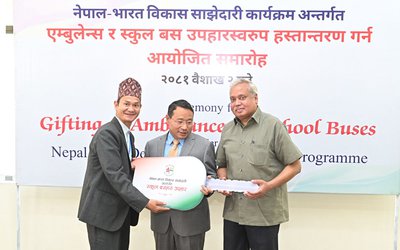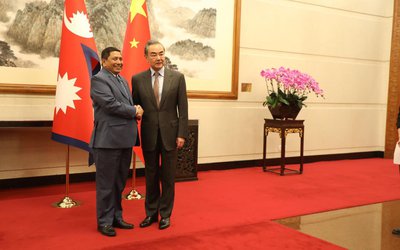Towards the global vision of reaching Zero new HIV infections, Zero discrimination and Zero AIDS-related deaths, Nepal presented its plan to guide focused HIV investment, on Monday 2 September 2013
Informed by evidence of where most investment will be needed, and geared towards achieving greatest returns, the Nepal HIV Investment Plan lays out areas where the country will strategically focus its resources to address HIV in the next three years.
Within the framework of the ‘Nepal National HIV Strategy 2011-2016’, the Investment Plan crystallizes ‘Getting to Zero’ as a joint venture between the Government of Nepal, civil society, and external development partners.
“We are proud of the progress we have made over the last decade to slow down Nepal’s HIV burden,” said Dr Tirtharaj Burlakoti, Chief of Policy, Planning, and International Cooperation in Nepal’s Ministry of Health and Population, at the presentation of the plan, in Kathmandu. “Too often, resources are stretched so thinly that they are unable to make impact. This plan will help ensure valuable resources are spent where they can make the most difference for Nepal,” he said.
The most prominent element in this HIV Investment Plan is that HIV testing in Nepal must be scaled up without delay, focusing on the most affected populations. The new WHO HIV Treatment Guidelines, and the UNAIDS ‘Treatment 2015’ initiative, provide both the evidence and the tools to apply recent scientific evidence on where and how to invest.
Nepal’s HIV Investment Plan also calls for strategic investments for full engagement of and partnerships with HIV competent communities to implement HIV programmes and strategies of a scope, scale, intensity, speed and quality to indeed achieve the Zeros.
Dr Naresh Pratap K.C., director of Nepal’s National Centre for AIDS and STD Control, cited the importance of meaningful involvement of HIV-affected communities within the development of the plan, who provided “crucial information and insights into the state of Nepal’s HIV burden, and how we must invest to reduce it.”
New strategies and frameworks for gearing investment towards an effective, efficient, and information-driven HIV response were introduced to Nepal by the Joint United Nations Program on HIV/AIDS (UNAIDS) at the end of 2012. Financial planning innovation, coupled with advances in science, provides a critical opportunity to build on progress made and rapidly secure further success.
“For the first time in the history of HIV, we have science firmly on our side,” said Dr Ruben F del Prado, UNAIDS Representative to Nepal and Bhutan. “The fact that anti-retroviral treatment also has an impact on preventing new HIV infections means we have an opportunity to progress even faster than before. To get the best results, we must let the evidence about what works best lead us to ending new infections, and keeping people with HIV alive, healthy and well.“
Kul Chandra Gautam, former Assistant Secretary General of the UN, Deputy Executive Director of UNICEF, and special adviser to the Prime Minister of Nepal, remarked: “the people who make changes in the HIV response understand that HIV is a burden to the entire society, not just the groups that epidemiology has identified as at-risk. Reducing the burden of HIV requires a lot of resources, but even more than resources, intelligent use of those resources across government and civil society.”
By instituting an HIV investment approach, Nepal positions itself as a compelling recipient of donor funds. UNAIDS applauds its partners in Nepal for charting an ambitious, evidence-driven, and crucial course towards sustainable results.
- TANAHU HYDROPOWER PROEJCT: A Significant Achievement
- Apr 15, 2024
- AMBASSADOR HANAN GODAR: Sharing Pain With A Nepali Family
- Mar 30, 2024
- VISIT OF KfW AND EIB TO NEPAL : Mission Matters
- Mar 25, 2024
- NEPAL BRITAIN SOCIETY: Pratima Pande's Leadership
- Mar 24, 2024
- NEPAL ARMY DAY: Time To Recall Glory
- Mar 15, 2024
















